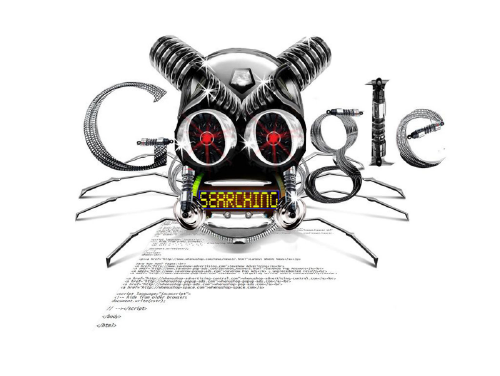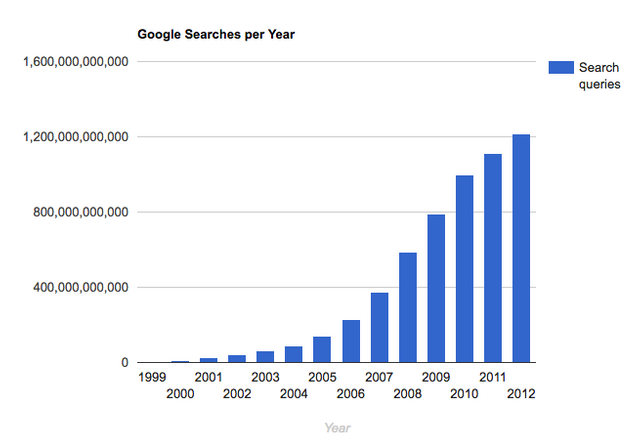Search engines are a part of our daily lives. If we want to solve an argument, we look up the answer on Google. If we want to know if our images and original photos are being used by others we do a reverse image search on Google. If we want the background on that new person we met, we look them up on a search engine. If we want to figure out how to learn something, fix something, do something - we look it up on a search engine. It’s hard to imagine a world where Google and other search engines don’t exist.
Google now processes over 40,000 search queries every second on average (visualize them here), which translates to over 3.5 billion searches per day and 1.2 trillion searches per year worldwide. The chart below shows the number of searches per year throughout Google's history:
Source (http://www.internetlivestats.com/google-search-statistics/)
There is nothing in the online world more shrouded in myth, misunderstanding, and mystery than SEO - search engine optimization. Because being found online is so often determined by search engine results of one sort or another, “experts” on SEO technique have sprung up and grown their ranks over the years. As with many industries, making SEO appear shrouded in mystery and arcane rules, also makes the practitioners appear to be magicians, achieving results that the mere mortal netizen couldn’t hope to gain without years of practice and study.
Nothing could be further from the truth. In fact, much of what is passed off as SEO knowledge is not effective, not useful long term, and in many cases will make it harder to be found once the trick of the month is discovered and countered by Google. SEO is not an arcane art form only successfully implemented by wizards who have been secretly inducted into the SEO Internet Wizard Society. SEO is a combination of marketing principles, logic, and common sense. It can be successfully practiced by ANYONE, anywhere, no matter what type of internet or blockchain work they may undertake.

Let’s look at how search engines came to exist and why SEO itself exists. I’ve been doing search work for over 20 years. My first website featured a rudimentary search engine - before Google even came into being. Theirs was MUCH better than mine, but the basics were exactly the same. Many early community sites like AOL and Tripod had search functions that allowed users to find web sites that featured content that matched the search term that was typed into a little box.
Search engines make it easy for people to find what they are looking for online. They rank websites and content by how well that content answers the question the user has typed into the search box. Coming in high on that list of answers is called “ranking” and optimizing your content to rank as high on that list for your chosen search terms is what Search Optimization is all about.
The search engines send out bots every second of every day to analyze virtually every page of content online. How many bots? Here’s the number of crawls done in 24 hours for the English word “the” Google bots conducted on February 2.

The instructions these bots are given by their Search Engine masters are called “algorithms”. The bots crawl through your pages and return a report to Google that tells Google what your site is all about and what words and queries it has information for. Google then ranks your page for specific search terms to determine when it will show that page url to a visitor as a possible source of information for their specific search term they entered in the search box.
That list of sites and pages is called the Search Results Page or SERP.
The prime directive for ALL search engines is to find and show the best content internet address to their visitors that will provide the best results for the search term that visitor entered. Over the years major search engines like Google and Bing have become very good at figuring out what pages and sites should be included in that page of search results.

There are also many “magic buttons” for sale that promise if you just use that piece of software, that technique, that app you will improve your rankings. Over the years Google has become very good at spotting these techniques and immediately takes steps to make those “magic buttons” obsolete. Sometimes sites and pages that use those will even be kicked into the Google basement - appearing only on page 999 of the results.
Make no mistake there ARE programs, tools, and apps that will make research and results tracking easier but they are often free and are NOT a magic button that guarantees results. If they are used correctly, and if you as the content provider understands what the search bots are looking for and how to satisfy them, you will improve your results, and you will not be caught up in algorithm changes designed to eliminate the flavor of the week shortcut to top SERP results that these “magic buttons” promise to produce.
There is no magic button. You don’t need to be an SEO wizard to achieve good rankings. All you have to do is optimize your website or content so the Google Bot can happily munch away on your content and easily determine what search questions that content will answer.
And that’s all SEO is - optimizing your content and your web site so visitors looking for the information you are presenting can find your information when they search the internet for it.
Achieving that optimization is not difficult. Several things come into play for good optimization, and when you master those things, your content will be found - consistently, no matter what search box is used - Google, Bing, Steemit, YouTube - it doesn’t matter. What works for one, works for all.
Now that we’ve gone over some of the basics of what SEO really is, we’ll get into how YOU can use it to get more eyeballs on your content in the next article.
Why Am I Writing This Stuff and How Will It Help Steem and Steemit?
I’ve been helping clients reach good rankings and teaching SEO for more years than I care to think about. Some of you may have taken part in Discord workshops and tutorial sessions I’ve had with various groups here on Steem. Because the blockchain is based on transparency and openness, it’s time to bring that training out from the private Discord groups for everyone on Steemit.
If we want Steem and Steemit to grow, we need to be able to compete for eyeballs on the traditional net in an effective manner. Thus, we need to know and understand SEO because it is the primary mover behind getting those eyeballs on our content. By breaking down SEO into manageable chunks of information, I’m hoping everyone reading these articles will be able to improve their own rankings and turn more conventional net people into Steemians.
Unless otherwise noted, images are courtesy of Pixabay

the title , and the #keywords used in the meta section of the html , should match the content of the page - plus reciprocal links - meaning you link to them and they link back-this is how I was taught- but then I heard #Google was changing its #algorithm @angrytwin
Downvoting a post can decrease pending rewards and make it less visible. Common reasons:
Submit
Keyterms and backlinks are a huge part of SEO, which I will explore in subsequent articles. Google changes its algorithm on average about 800 times per year. Most of those changes are small tweaks, usually designed to stop the latest black hat endeavors. Every year or 18 months (on average) there is a major, named change such as Penguin or Panda or maybe the next one will be called Cute Kittens. Those are the ones that address internet usage changes, such as more emphasis being given to sites that are mobile friendly to reflect the increase in mobile users. They are well publicized in the SEO community with instructions for being algo friendly published several months prior to the implementation of the algorithm.
IF you do your keyterms and links the right way - they will be evergreen and survive any algo change, major or minor. However, if you have followed the flavor of the week advice especially regarding backlinks, you will probably see a drop in your rankings.
Downvoting a post can decrease pending rewards and make it less visible. Common reasons:
Submit
Oh, all the aspects of SEO seem so hard for me. I can't understand it totally, but thx for your article
Downvoting a post can decrease pending rewards and make it less visible. Common reasons:
Submit
An interesting article, although of course there is no magic and mystery here. Everything is quite simple in words, but in fact I don't really want to do everything myself, so I'd rather turn to specialists who understand ahrefs site audit. Unlike me, dummy, these specialists know how and what to do to promote the brand.
Downvoting a post can decrease pending rewards and make it less visible. Common reasons:
Submit